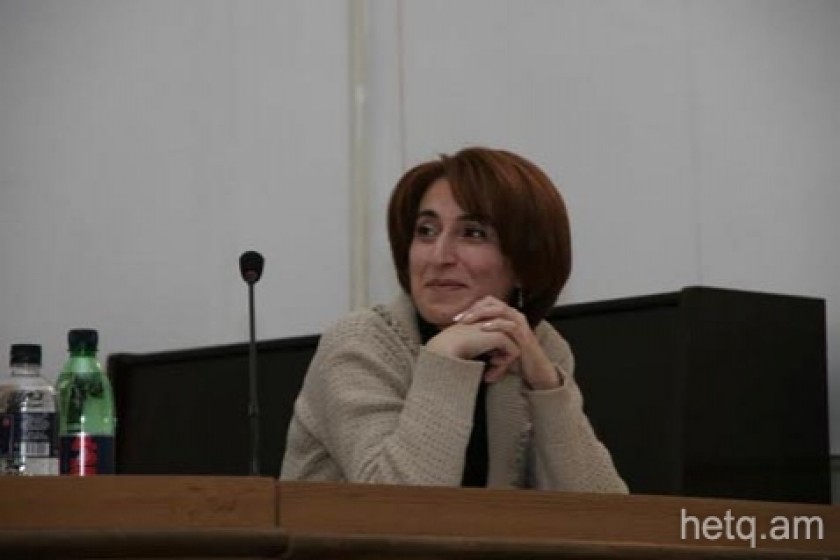
Film Critique: 'There's a disconnect between cinema and viewer in Armenia'
Film critic and historian Siranoush Galstyan has much to say about the state of Armenian cinema today. She shares some of her views and criticisms with Hetq in the following conversation.
If we were to observe our reality as a film, how would you characterize it?
There is much that is unbearable in reality today. One can focus in on that filth and say that I’m merely recording reality. But such unpleasantness can be photographed in different ways. It’s all a question of presentation.
We see such contradictions in our daily reality. Poverty and opulence living side by side, extremities and contrasts as much as you want exist. One individual is struggling to eat, while another is only interested in acquiring the latest make of automobile. Reality is multilayered, but there is always an issue of choice. What’s most important, however, is how to present it.
To what extent do the films being made today actually reflect our reality?
The most dramatic change that has occurred in our cinema has been the disconnect between film and the audience. The same issue even exists in a land of plenty like the United States. Our audiences today have practically no idea of what is being filmed. If you go out on the street and ask passersby what films they have watched in the past ten years, they’ll remember very little.
I would think that in the main they would remember the films of Hratch Keshishyan, because his films mostly make it to the big screen and then get shown on television.
If we talk about his first work that successfully played on the big screen it was the film “Spanvatz Aghaviner” (Murdered Pigeons). It wasn’t that bad as a TV movie or a mini-serial, but apart from that it had its shortcomings. When I went to see that film I was happy to see that the advertising had worked. Armenians had missed seeing their fellow countrymen on the screen. They had missed the classical works. The next film was “Khachagoghi Hishatakaranu” (Memoirs of a Cross-Thief). But I have certain objections with the selection. If he wanted to make a film based on the works of Raffi, why didn’t he choose “Kaytzer” (Lightning) or “Khentu” (The Fool)? He could have even combined the two to make something interesting. Then came “Garegin Nzhdeh”. Yes, there was a real need for the film to be made, but nevertheless, I found it riddled with holes.
What holes are you referring to?
From a professional standpoint, there are holes in the approach to the material. I liked the performances of the two actors who played Garegin Nzhdeh, but the need for two actors to play the same role remained unclear for me. Now, there are movies where actors are changed during filming, but the director must explain why. Otherwise audiences might get confused. I also found problems with the script.
Why is it that the films of certain directors make it to the screen while the works of others remain inaccessible to audiences?
This usually is the case when the film disappears right after being premiered. I believe that television must be used to reconnect movies with moviegoers. There should be a short but focused weekly program or two on the movie scene in Armenia. People should be provided with some information about what films are being made and which ones will be coming to the screen. Instead, even the sporadic films made for TV have left a bad taste in the mouths of viewers. So much so, that people have been accustomed not to expect much of quality. Even without watching, people expect the film to be not worth the watch.
Of the films made in the last ten or fifteen years, which ones would you note as must-sees and films worthy of wide distribution?
Off the top of my head, I’d say Souren Babayan’s “Zhano” and “Mi Nayir Hayelou”; Vigen Tchaldryan’s “Lrutyan Symphony” and “Dzayn Lrutyan”; Hovhannes Galstyan’s “Khdjdjvatz Zugaherner”; and “Yeteh Boloru” by Mikayel Poghosyan and Natalya Belyauskeny. It concerns me why we don’t even know that these films have been made. But it’s not the fault of the potential audience.
Let’s take a look at the technical aspects of movie viewing. In Armenia there are only a handful of movie theaters and many watch films via the internet. Can anything be done to change this?
In the U.S., a country with the most advanced technologies, people line up to see a movie at the theater. It’s tragic that there are so few movie houses in Armenia. We have to find ways to use what we have more effectively. Sure, movie houses have to make a profit to operate, but I believe that the films I’ve mentioned could pull in loads of viewers if the right policies were put into place. The oft heard opinion that what is being shown is really what viewers want is either an expression of naiveté or deliberate cunning.
Are you trying to tell me those viewers actually are demanding this junk? Such a view is an insult to the moviegoer. In reality, supply shapes demand.
In that case, what is the demand of the viewer? What would they like to see on the screen?
I don’t think that we can guarantee a large variety in terms of genre given the scarcity of resources. But we have a big demand for quality comedy today.
That same reality which saddens and disillusions us must be presented through a comic lens. It must be done professionally and in good taste. Comedy, quality comedy, is a tough act. There’s a dearth of good comedy as evidenced by what passes as comedy or humor on Armenian TV.
People have to be patient and sit through corny and crass jokes just to hear one example of actual comic fare.
 Videos
Videos Photos
Photos
Comments (4)
Write a comment